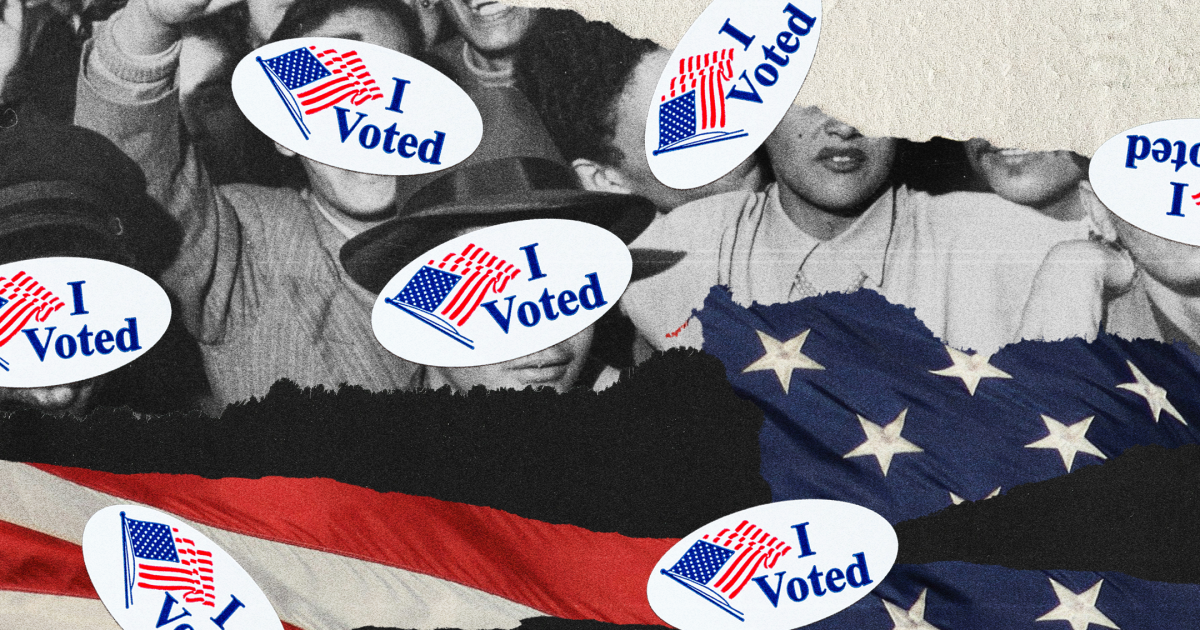
The California Latinx electorate has a lot on its mind as the Golden State speeds toward a special election this November and a decision on the hot-button Proposition 50, which would redraw the state’s congressional districts to favor Democrats.
A recent poll from the Latino Community Fund — a philanthropic organization that advocates for Latinx people and racial justice — and the Latinx-owned research firm BSP Research looked into the top issues that California’s registered Latinx voters want their elected officials to address. Earlier this month, a total of 1,200 voting-registered Latinx Californians were surveyed online and over the phone in their preferred language as part of the poll.
The study showed that such voters are determined to hit the voting booth this fall with 62% signaling that they were “100% certain” to vote in November’s election and an additional 21% stated they would “probably” vote in the special election.
Julián Castro — the Latino Community Fund’s chief executive and former U.S. secretary of Housing and Urban Development — was pleased to see that the Latinx community is planning on exercising its civil liberties.
“It’s certainly encouraging that people are paying attention and they have their civic antenna up more than we usually see for special elections in off years,” Castro told The Times in a phone interview. “But it’s not surprising with everything that’s happening to the Latino community, especially in California — whether it’s overzealous immigration raids, cuts to healthcare, bad policies coming out of Washington or the question of Proposition 50 — people are getting deluged with issue after issue that affects them.”
Of all those looking to vote, 47% plan on using vote-by-mail or absentee ballots. These results come one month after President Trump announced his plan to do away with mail-in voting ahead of the 2026 midterm elections, claiming that it results in less accurate data collection (these claims have been disproved).
On a related note, 66% of those polled expressed worry about the possibility of the president sending federal officials to monitor voting centers and polling places in during the November special election.
“The attacks on voting by mail are cynical attacks meant to undermine turnout. I’m happy to see that many Latinos are comfortable voting by mail,” Castro said. “Voting by mail is an effective and secure way to express your voice democratically if you’re not comfortable going to a voting center.”
Two-thirds of those surveyed disapproved of Trump’s handling of the presidency, while 65% approved of Gov. Gavin Newsom’s handling of his elected position. Support of Newsom was also highlighted among the poll respondents with three-fourths being in favor of recent legislation targeting masked federal immigration officers who began detaining migrants at Home Depots and car washes in California earlier this year. Trump’s immigration leaders argued that masks are necessary to protect the identities and safety of immigration officers.
When it came to the topic of Proposition 50, 85% of the electorate agreed that it was important that the new temporary congressional map in California creates districts in which Latinx candidates have a fair opportunity to win election to Congress.
“Many Latinos feel an immediate threat from the policies and the practices that are coming down from Washington, and they want to make sure that everybody has a fair shot in this country,” Castro said. “It’s a community that embodies the best values of our country and is a hard-working community. They also want to know that their hard work and their belief in America is going to be matched by a legal system and a series of policies and resource investments that are fair and equitable.”
However, only 46% said they’d vote yes to a new map and 29% didn’t know how they’d vote on it. Additionally, 57% had no idea how a new congressional map would affect their community.
Despite how confounding those sets of data points may seem, BSP Research co-founder and co-president Gary Segura wasn’t surprised by those findings.
“In general, people are supportive of the redistricting and supportive of Proposition 50, but they don’t know a lot about the origin. People don’t know about Texas [redistricting] and a lot of people don’t know whether or not their own districts have been redrawn. And that’s not uncommon,” Segura told The Times. “If I asked what congressional district someone lives in, many people can’t answer that question — regardless of race, ethnicity, gender or whatever. It’s not something everybody’s aware. It’s not surprising to me that many people have no idea.”
Regarding immigration, 49% responded that they are in favor of deporting only undocumented people who have a proven criminal record or a warrant for their arrest. Only 14% favored deporting all undocumented people, while 37% did not favor any large-scale deportation policies.
What was overwhelming agreed on when dealing with immigrants was the right to a fair trial, with 76% of the surveyed aligning with the idea that any immigrant accused of a crime should be allowed to receive a fair court hearing with evidence before they face deportation.
Another three-fourths of those polled agreed that the president is breaking his promises on immigration and “unfairly targeting average everyday undocumented immigrants in the community who are not violent”
When it came to feeling protected and cared for by the two major political parties, 56% of participants felt that California Democrats “care a great deal” about the Latinx community compared to 29% expressing that California Republicans “care a great deal” about them. The electorate agreed that Republicans were more likely to “be hostile” to the Latinx community at 31% than Democrats at 8%. But they were aligned in feeling neglected with 36% saying Democrats and 40% saying Republicans “don’t care enough” about the Latinx community.
“I would say the biggest finding here is that folks are pretty taken aback by everything associated with the president’s actions,” Segura said. “That’s going to really shape their views so that some of the folks who supported [Trump] in 2024 may no longer be in that category. And by contrast, the folks who are Democratic supporters feel stronger in that identity.”
The finding that Segura and Castro both found most surprising was the level of pessimism that the electorate expressed, with 44% believing that things will get worse over the next few years compared to 42% thinking things will be better.
“Even when things are objectively very difficult, Latinos generally think next year is going to be better. It’s just part of the cultural narrative, and we almost always find that Latinos are more optimistic than [other ethnic groups],” Segura said. “But this time Latinos were more pessimistic than optimistic and I actually don’t think we’ve ever seen where that happens in all of our years. That really captures the level of personal struggle in the community. It’s not just that things are dead economically, it’s that they feel they’re under attack.”
On top of being surprised by the result of pessimism, Castro labeled the finding as the most “disappointing” in the survey.
“I’ve always said that our community is so aspirational and fundamentally optimistic, and that’s almost always reflected in polling from just about any place in the country,” Castro said. “To see much less optimism than usual from the community is disappointing, but it’s also unfortunately reflective of the challenges that the community is facing with the current administration — from the overzealous immigration crackdown to bad policies that haven’t lifted the economy to others.”
Castro called the shift in future outlooks “understandable” given the political commotion in the country at the moment, but maintained that the push toward a more just future must continue in spite of it all.
“We’re all called to find ways that we can push for policies that invest in the Latino community, that treat everybody fairly and create a brighter future for our families,” he said. “It’s a time when everybody is called in their own way — however they’re able to — to push for a different future.”
One refugee’s harrowing migration story
My colleague Melissa Gomez wrote an expansive and incredibly well-reported piece about a refugee from Venezuela, Jerardyn, living in the U.S. who makes the decision to migrate once again to avoid being caught up in the ongoing ICE raids.
Accompanied by her 7-year-old daughter and 10-year-old son, Jerardyn was forced to navigate the complex immigration systems of several countries while also putting her life on the line as she made several crossings of the Darien Gap.
“No one knows what you live through in your country,” Jerardyn said of making a her decision to leave Venezuela. “If I had stayed there, my kids could have died from hunger, suffered psychological torture, kidnappings, so many things… I’m just trying to save them.”
You can read the whole article here.
Stories we read this week that we think you should read
Unless otherwise noted, all stories in this section are from the L.A. Times.
Immigration and the border
What social media got wrong about the ICE raids of the Santa Fe Springs Swap Meet
Is Tren de Aragua a real threat — or a convenient villain?
A former DACA recipient died in ICE custody. Did officials ignore his pleas for help?
She was almost deported as a child. Now she holds a key post overseeing the LAPD
Veterans who lack citizenship fear being swept up in Trump’s deportations (AP)
ICE offers big bucks — but California police officers prove tough to poach
As ICE raids surged this summer, emergency calls to LAPD plummeted
400-plus arrested so far in federal immigration crackdown in Chicago area (AP)
ICE denies using excessive force as it broadens immigration arrests in Chicago (AP)
Don’t hold your breath, but as raids stifle economy, Trump proves case for immigration reform
His cellmates self-deported. He fought to get back to his family
Newsom signs bills to limit immigration raids at schools and unmask federal agents
Arts and Entertainment



